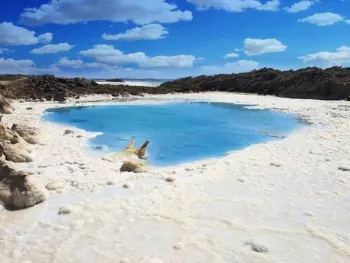
Since our most popular product is our Ancient Minerals – a Genuine Zechstein topical magnesium chloride – we’re often asked our opinion on other magnesium products on the market. Being that we are magnesium advocates, we encourage the utilization of multiple sources between oral supplementation, topical applications, and magnesium-rich foods. However, one of the most popular sources used for magnesium chloride in cosmetic products is the Dead Sea, so we wanted to take the time out to discuss this in more detail.
Firstly, we do not recommend the use of minerals sourced from the Dead Sea – and yes, that will probably get a few gasps of outrage from diehard Dead Sea lovers.
Given our high standards for purity within our product lines, we tend to swerve away from anything that doesn’t fit that mold. There are so many toxins in our environment already that unnecessarily subjecting ourselves to more just seems counterproductive – especially when the exposure is through supplements or cosmetics. So, that being said, the Dead Sea happens to land on our spectrum of “unnecessary exposure”… as well as being currently unsustainable (we’ll get to that).
Pollution
A combination of tourism, agriculture & everyday life along with a thriving mining industry has transformed this treasured wellness retreat into a pathetic shadow of its former self. The even more disturbing aspects, though, are ones that you most likely won’t hear or read about unless you subscribe to local media outlets such as the Jerusalem Post. For years now the Dead Sea has been an unwilling receptacle for raw, untreated sewage… yes, sewage. Not quite as nauseating, but equally detrimental is the agricultural contributions such as fertilizers, pesticides, and animal waste, along with general litter that makes its way into the water and around the shorelines.
It almost feels like an insult given the prestigious image that has been cultivated and imprinted on our minds for so long, but there you have it.
Although this tarnishes the long-held image of the Dead Sea, it’s safe to say that the majority of marine magnesium sources have equal if not greater pollution issues to contend with (radiation anyone?). We’ve all seen the damage that humans are capable of, unfortunately, and our reach is far and wide. If you decide to utilize health or personal care products that contain ingredients sourced from the Dead Sea or ocean, we recommend asking to see a copy of the actual tests that have been done (heavy metal, plate count, VOC, etc.) in order to verify the purity of the product. If they do not have this information available or refuse provide it, it’s probably a good indication that the products should be avoided.
Unsustainable & At Risk
One of the things that we do our best to uphold as a green business is sustainable sourcing. In the state that our planet is currently in, making sure to have as little environmental impact as possible is an important piece of “doing our part.” Not only that but it helps maintain regional economic stability.
In recent years, as the use of magnesium chloride in various industries has exploded, the Dead Sea has dwindled to alarming levels. In the last 50 years, its water level has dropped over 82 feet, and continues to lose around 3 feet per year. This continuing decline has far-reaching environmental, social, and economic repercussions – repercussions that have driven affected governments to propose a costly plan in an attempt to rectify the issue (See: Red Sea -Dead Sea Canal). The loss of water is also among the major contributors to the appearance of sinkholes pockmarking the Dead Sea’s banks, resulting in closed roads and fenced-off areas warning visitors of the surrounding unstable grounds.
Despite the possibility of a solution in its future, the Dead Sea is not the first body of water to trod the path to ruin. Numerous water sources have met their demise at the hands of humans over the years, while others dance close to the edge. One that’s currently dangling on the precipice is the Aral Sea in Kazakhstan, having shrunk to under 10% of its original size since the 1960’s.
Taking these significant factors into consideration, our lack of support for Dead Sea sourced products should be understandable – even for those aforementioned diehard fans. Perhaps one day, it will once again be the pristine haven of yesteryear, but until then… we choose to steer clear.
As always, we welcome your questions, comments and feedback, so leave a comment below or email us directly!
